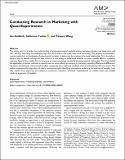Conducting Research in Marketing with Quasi-Experiments
Author(s)
Goldfarb, Avi; Tucker, Catherine; Wang, Yanwen
DownloadPublished version (670.7Kb)
Publisher with Creative Commons License
Publisher with Creative Commons License
Creative Commons Attribution
Terms of use
Metadata
Show full item recordAbstract
<jats:p> This article aims to broaden the understanding of quasi-experimental methods among marketing scholars and those who read their work by describing the underlying logic and set of actions that make their work convincing. The purpose of quasi-experimental methods is, in the absence of experimental variation, to determine the presence of a causal relationship. First, the authors explore how to identify settings and data where it is interesting to understand whether an action causally affects a marketing outcome. Second, they outline how to structure an empirical strategy to identify a causal empirical relationship. The article details the application of various methods to identify how an action affects an outcome in marketing, including difference-in-differences, regression discontinuity, instrumental variables, propensity score matching, synthetic control, and selection bias correction. The authors emphasize the importance of clearly communicating the identifying assumptions underlying the assertion of causality. Last, they explain how exploring the behavioral mechanism—whether individual, organizational, or market level—can actually reinforce arguments of causality. </jats:p>
Date issued
2022-05Department
Sloan School of ManagementJournal
Journal of Marketing
Publisher
SAGE Publications
Citation
Goldfarb, Avi, Tucker, Catherine and Wang, Yanwen. 2022. "Conducting Research in Marketing with Quasi-Experiments." Journal of Marketing, 86 (3).
Version: Final published version